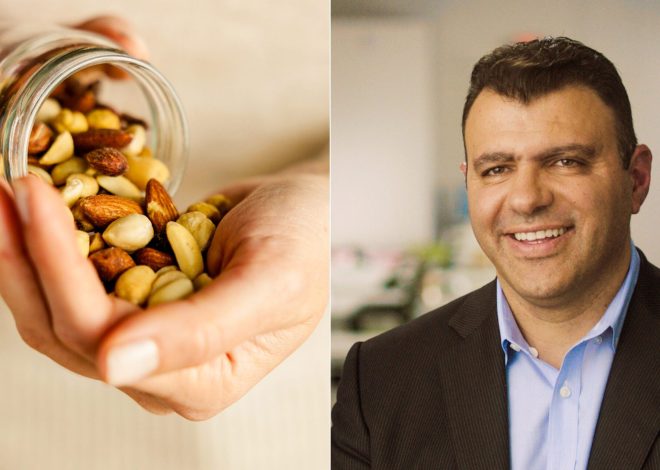
This is what happens in the body when we stop eating sugar
During Lent, many people give up sugar and sweets. But what actually happens when you suddenly stop eating sugar? When do you start to feel an effect? And does giving up sugar only have a positive effect on the body – or are there also disadvantages?
It’s all about this:
When we talk about giving up sugar, we usually mean regular table sugar (sucrose). However, there are a number of different types of sugar.
Sugar: What does that actually mean?
All types of sugar are carbohydrates: These consist of sugar building blocks connected to each other. A distinction is made between simple sugars (monosaccharides) and multiple sugars (polysaccharides). The simple sugars include fructose (fructose) and glucose (glucose). Table sugar (sucrose) and milk sugar (lactose) are disaccharides. Both types of sugar have a sweet taste.
get in touch for free and read on.
Register now for free
- free MyUtopia account
- all premium articles free
- exclusive offers from our partners
The long-chain polysaccharides, on the other hand, do not taste sweet: They are contained in the form of starch in many plant foods and serve as an important source of energy.
The sugar that we often want to avoid when fasting – household sugar – is obtained either from sugar cane or sugar beet.
Health effects of sugar consumption
There is a clear scientific classification regarding the health effects of sugar: The less sugar, the better. Because: High sugar consumption is associated with diseases such as tooth decay, overweight, liver disease, obesity, type 2 diabetes and cardiovascular diseases.
The German Society for Nutrition recommends a maximum of 10 percent of the energy required daily through sugar – these are the average adult maximum 50 grams of sugar per day– about six teaspoons.
However, most people in Germany exceed this recommendation: According to the National Consumption Study, adults consume an average of about 13 percent of their energy from sugar, and children even consume 16 percent.
The only advantages of sugar are that it tastes good and provides quickly available energy. But why is it so difficult for us to give up sugar?
Why is it so difficult for us to give up sugar?
From a purely evolutionary perspective, there is actually a good reason to prefer sweet things: A sweet taste signals our ancestorsthat the food was well tolerated. Because: Toxins usually taste bitter. Sugar also provides quickly available energy.
In addition, both human amniotic fluid and breast milk taste sweet, hence the theory that Babies are accustomed to a sweet taste before birth At the same time, many people have learned in early childhoodto calm down, comfort or reward oneself with sweets.
In fact, our biological reward system Another reason why we like to eat sugar. Sweet foods activate the brain’s reward center: when we eat something that we particularly like, our body wants more and we may feel like we can’t stop. However, we still can’t talk about a “sugar addiction”.
What happens if you stop eating sugar?
That’s why it’s not easy for most people to give up sugar. Depending on the amount of sugar your body is used to, it will individual time for the changeover need.
Giving up sugar: The first few days
When you stop eating sugar, your Regulate blood sugar levels – which were previously used to fluctuationsEspecially if you have eaten a lot of sweets, you will probably soon Cravings have and you less energetic feel.
In addition to the physical effects of giving up sugar, you will probably get it after a short time psychological effects feel: Maybe there are certain situations – dessert after dinner, a piece of cake in the afternoon or a chocolate bar in front of the TV – in which eating sugar is part of your routine. Breaking this habit can be challenging. If you generally tend to regulate your emotions with sweets, you will probably have difficulty giving up sugar at first. Maybe that’s why you are more irritable than usual in the first few days.

In self-experiments, additional – initially negative – effects are occasionally reported in the first few days of avoiding sugar:
- Circulation & concentration problems
- Headache
- fatigue
- Tremble
Giving up sugar: phase two
Once the first few sugar-free days are over, your body will have adjusted and regulated your blood sugar levels. You will probably feel fitter and your Feelings of hunger and your sense of taste have adapted.
The exact effects of giving up sugar depend on many factors: Basically, every body reacts differently, and your general state of health and the amount of sugar you previously consumed also influence the effects. It is therefore likely that you will feel some, but not all, possible effects if you give up sugar for a longer period of time.
After a few days to weeks, giving up sugar can have the following effects:
- less cravings
- improved sense of taste
- Reduction of weight
- better concentration
- more energy
- decreased blood pressure
- Reduction of joint pain
- Improvement of cholesterol, liver, thyroid, kidney and urea values
- more beautiful skin
- increased sleep quality
- healthier teeth
- improved intestinal health
- better immune system
Scientific studies have proven most of these effects: A study by the Stanford School of Medicine confirms that avoiding sugar makes it easier to lose weight. The reduction in blood pressure – possibly associated with fatigue and circulatory problems – the improvement in blood, insulin and liver values, as well as heart rate, and the reduction in abdominal and liver fat have also been scientifically studied. Other effects – such as the improvement in the complexion – cannot be clearly proven.
How to stop eating sugar
The initial period of giving up sugar is exhausting. It is helpful drink plenty of fluids, get enough sleep and avoid stress – or reduce it as much as possible. If you have cravings, it can help to eat a piece Fruit or a handful of nuts to eat, Sports can lift your mood when you are feeling down.
It is helpful to first Clean out the pantry and supplies: If you don’t have sugar or sweets in the house, you won’t even be tempted.
Maybe there are people around you who want to join in giving up sugar? It’s often easier to do things togethermotivate and stop eating sugar. Try to change your habits together and find new alternatives: Which tea tastes best instead of soft drinks? Which snack helps you overcome sugar cravings? What is the best dressing recipe as an alternative to the (sugary) ready-made dressing?
Basically it is recommended to cook a lot yourself: Then you can decide for yourself whether and how much sugar you use.
Be patient: You may still feel a craving for sugar even after weeks. Studies show that it takes at least three weeks to change a habit. And if you do give in, don’t be too hard on yourself! Much more important than completing a sugar-free challenge is a fundamentally healthy and balanced diet.
Do you like this post?
Thank you for your vote!

Ethel Purdy – Medical Blogger & Pharmacist
Bridging the world of wellness and science, Ethel Purdy is a professional voice in healthcare with a passion for sharing knowledge. At 36, she stands at the confluence of medical expertise and the written word, holding a pharmacy degree acquired under the rigorous education systems of Germany and Estonia.
Her pursuit of medicine was fueled by a desire to understand the intricacies of human health and to contribute to the community’s understanding of it. Transitioning seamlessly into the realm of blogging, Ethel has found a platform to demystify complex medical concepts for the everyday reader.
Ethel’s commitment to the world of medicine extends beyond her professional life into a personal commitment to health and wellness. Her hobbies reflect this dedication, often involving research on the latest medical advances, participating in wellness communities, and exploring the vast and varied dimensions of health.
Join Ethel as she distills her pharmaceutical knowledge into accessible wisdom, fostering an environment where science meets lifestyle and everyone is invited to learn. Whether you’re looking for insights into the latest health trends or trustworthy medical advice, Ethel’s blog is your gateway to the nexus of healthcare and daily living.



